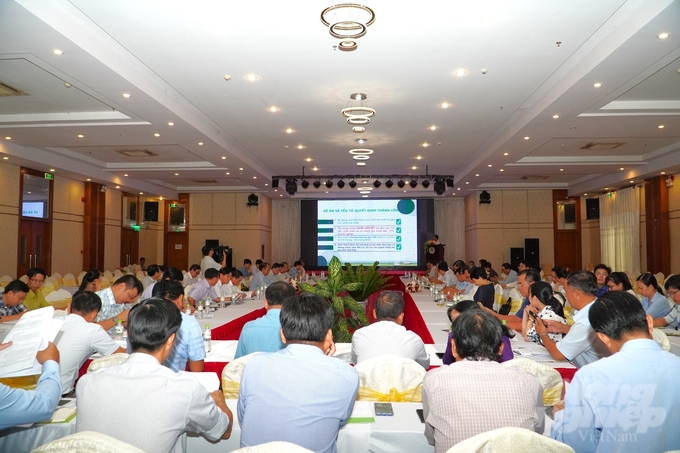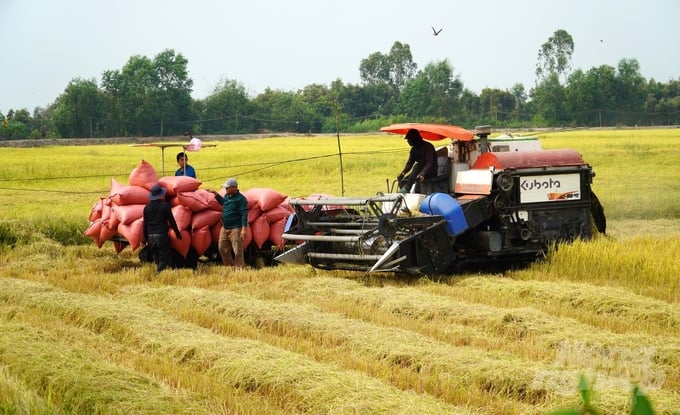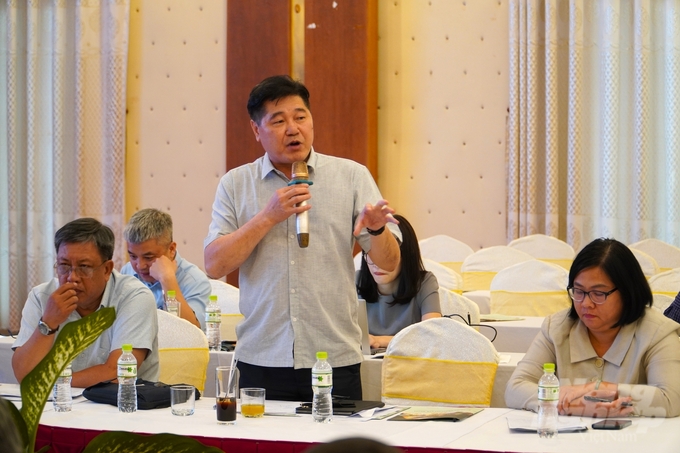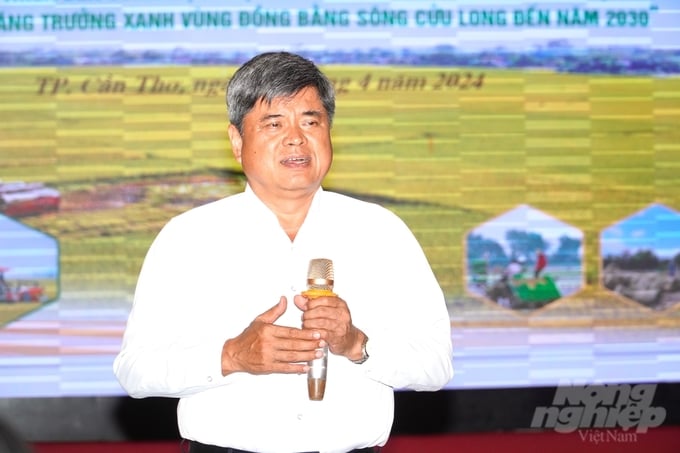May 17, 2025 | 22:43 GMT +7
May 17, 2025 | 22:43 GMT +7
Hotline: 0913.378.918
May 17, 2025 | 22:43 GMT +7
Hotline: 0913.378.918
The Ministry of Agriculture and Rural Development convened a conference in Can Tho City on April 2 to discuss a strategy for strengthening the capabilities of value chain development, partners, and agricultural cooperatives in order to effectively execute the Sustainable Development Project for 1 million hectares of high-quality rice with low emissions linked to green growth in the Mekong Delta region by 2030.

At the conference, leaders of the Ministry of Agriculture and Rural Development have agreed and directed the 12 provinces and cities in the Mekong Delta region to promptly implement the program. Photo: Kim Anh.
In addition, the conference solicited local input regarding the proposed decision to establish guidelines pertaining to the selection of criteria and engagement in the project.
As per the strategy, in excess of one million individuals shall be educated and equipped to assist in the execution of the undertaking. Training of Trainers (ToT) lecturers, managerial and technical staff of cooperatives/associations registering to participate in the project, agricultural extension officers, government officials at all levels, farmers, technical and agricultural workers, and those accountable for raw materials in enterprises are the six primary target groups identified in the capacity enhancement plan.
Between 2024 and 2025, the project will successfully conclude capacity-building and training for an estimated 208,000 individuals. Throughout the years 2026 to 2030, the initiative will further develop the skills and knowledge of more than 812,000 individuals.
Director of the Department of Economic Cooperation and Rural Development Le Duc Thinh stated that the Department consulted 21 units, including 12 provinces and cities in the Mekong Delta region, to unify and complete the content of this plan.

According to the plan, over 1 million people will be trained and capacitated to serve the implementation of the 1 million hectares of high-quality rice project. Photo: Kim Anh.
12 training materials will be developed by the Department of Economic Cooperation and Rural Development in 2024 for a variety of target groups. These materials will be accompanied by handbooks and usage guidelines. Furthermore, the department plans to conduct twelve ToT training courses this year. In particular, instruction will be completed for 2,000 technical and managerial personnel representing 400 agricultural cooperatives that are part of the VnSAT Project. Emission reduction agricultural practices and MRV plans (Measurement, Reporting, and Verification system for greenhouse gas emission reduction) comprise the majority of the training material.
In regard to the Department of Agriculture and Rural Development of the 12 provinces and cities in the Mekong Delta region, training for registered cooperatives and associations aiming to partake in the 1 million hectares of high-quality rice project will be proactively coordinated in accordance with the established timetable.
Huynh Lam Phuong, Head of the Southern Office of the Vietnam Cooperative Alliance, underscored the criticality of meticulously selecting cooperative members to partake in the training activities in order to optimize the efficacy of the program. This is to prevent circumstances in which comprehensive training is delivered with a restricted number of participants.
Le Quoc Thanh, Director of the National Agricultural Extension Center, separated the 1 million hectares of high-quality rice project from others by emphasizing how it will bolster the capabilities of the entire system, encompassing all participants in the rice production value chain.

Mr. Le Quoc Thanh, Director of the National Agricultural Extension Center (standing) delivered a speech at the conference. Photo: Kim Anh.
The initiative endeavors to provide training solutions for emission reduction farming practices, in addition to technical training. Agricultural extension officers and community extension workers are recognized for their involvement in facilitating connections between producers, cooperatives, and businesses.
During the conference, Tran Thanh Nam, the Deputy Minister of Agriculture and Rural Development, underscored the importance of agricultural cooperatives' performance in the 1 million hectares of high-quality rice project as the determining element in the endeavor's triumph or demise.
Whether cooperative development is average or sluggish at present, municipalities must make every effort to revitalize these vital collective economic organizations. The two primary targets of this capacity enhancement training plan, according to Deputy Minister Tran Thanh Nam, are agricultural extension officers and cooperative members, with a particular emphasis on grassroots extension workers and community extension workers.
Deputy Minister Tran Thanh Nam is optimistic that local agricultural sectors will establish specific instructions on how farmers can understand and participate in the 1 million hectares of high-quality rice project. By doing so, they can obtain a range of advantages, including diminished production expenses, partial reimbursement of carbon credits, and enhanced value from the rice brand associated with reduced emissions.

Deputy Minister of Agriculture and Rural Development Tran Thanh Nam emphasizes that the success of agricultural cooperatives participating in the 1 million hectares of high-quality rice project is the determining factor for the success or failure of this project. Photo: Kim Anh.
The project will concentrate on consolidating and enhancing the quality of more than 182,000 hectares of rice that have been involved in the VnSAT Project since 2024. Additionally, it will seek to expand into areas that have not yet been involved. Cooperatives with substantial experience will be chosen by localities in an effort to improve cooperative quality. Cooperative leaders in regions lacking the implementation of the VnSAT Project must exhibit dynamism and innovation.
At present, the MARD has made the decision to deploy five pilot models in Can Tho City, Tra Vinh, Soc Trang, Kien Giang, and Dong Thap provinces, for the duration of 2024 to 2025. Varying in size from 50 to 100 hectares, each model implements MRV techniques and rice cultivation practices to reduce emissions.
When emission-reduced rice has been established between August and September 2024, municipalities will proceed with additional implementations for the winter-spring crops of 2024 and 2024-2025. The proposal for emission reduction coefficients will be presented to the Ministry of Agriculture and Rural Development for approval following three seasons of evaluation and measurement.
Deputy Minister Tran Thanh Nam issued the directive that localities shall dispatch representatives from the six target groups to partake in training programs pertaining to MRV planning, sustainable agricultural practices, digital transformation, and other related topics the week following.
Translated by Linh Linh

(VAN) Muong Nhe Nature Reserve hopes that being upgraded to a national park will lay the foundation for forest protection efforts to be carried out in a systematic, modern, and sustainable manner.
/2025/05/16/3923-2-171845_52.jpg)
(VAN) Lower costs, higher yields, and improved soil quality are outstanding benefits that soybeans bring when integrated into the crop rotation system.

(VAN) The 'For a Green National Environment' programme aims to promote a green lifestyle, support businesses in implementing ESG practices, and turn Net Zero commitments into concrete actions.

(VAN) Cold-barn systems efficiently manage environmental and temperature conditions, which aids in the prevention of respiratory diseases in pigs and protects them from the vectors that transmit African swine fevers.

(VAN) To tackle challenges, the project 'Addressing key technical bottlenecks in the grouper supply chain in Vietnam' has been underway since 2024.

(VAN) The project 'Disease-Resilient and Sustainable Cassava Production Systems in the Mekong Region', funded by the Australian Center for International Agricultural Research (ACIAR), is being implemented from 2024 to 2028.

(VAN) Data from 10,000 farming households will help professionalize production organization and support the implementation of the One Million Hectares Program for High-Quality, Low-Emission Rice Cultivation.